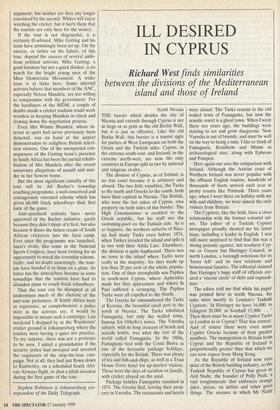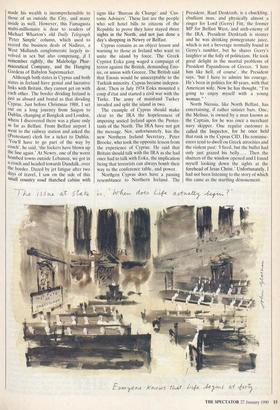ILL DESIRED IN CYPRUS
Richard West finds similarities
between the divisions of the Mediterranean island and those of Ireland
North Nicosia THE harrier which divides the city of Nicosia and extends through Cyprus is not as large or as grim as the old Berlin Wall, but it is just as effective. Like the old Berlin Wall, this barrier is a tourist sight for parties of West Europeans on both the Greek and the Turkish sides. Cyprus, in the extreme south-east, and Ireland, in the extreme north-west, are now the only countries in Europe split in two by national and religious rivalry.
The division of Cyprus, as of Ireland, is no less cruel because it is arbitrary and absurd. The two little republics, the Turks to the north and Greeks to the south, both have their capitals in Nicosia. The British, who were the last rulers of Cyprus, own property on both sides of this border. The High Commissioner is credited to the Greek republic, but his staff use the swimming-pool on the Turkish side. As it so happens, the northern suburbs of Nico- sia had many Turks even before 1974, when Turkey invaded the island and split it in two with their Attila Line. Elsewhere, the division is quite haphazard. There was no town in the island where Turks were really in the majority, for they made up less than 20 per cent of the whole popula- tion. One of their strongholds was Paphos in south-west Cyprus, where Aphrodite made her first appearance and where St Paul suffered a scourging. The Paphos Turks were all expelled to the North.
The Greeks far outnumbered the Turks at Kyrenia, the beautiful small port to the north of Nicosia. The Turks inhabited Famagusta, but only the walled town, famous for Othello's tower. The Varosha suburb, with its long crescent of beach and seaside hotels, was what the rest of the world called Famagusta. In the 1960s, Famagusta vied with the Costa Brava as one of the favourite package holidays, especially for the British. There was plenty of tea and fish-and-chips, as well as a Trust House Forte hotel for up-market visitors. Those were the days of vacation en famine, with cricket played on the sand.
Package holiday Famagusta vanished in 1974. The Greeks fled, leaving their prop- erty in Varosha. The restaurants and hotels were closed. The Turks remain in the old walled town of Famagusta, but now the seaside resort is a ghost town. When I went there ten years ago, the buildings were starting to rot and grow dangerous. Now Varosha is out of bounds, and must be well on the way to being a ruin. I like to think of Famagusta, Benidorm and Miami as archaeological sites, along with Ephesus and Pompeii.
Here again one sees the comparison with Ireland. Although the Antrim coast of Northern Ireland was never popular with the affluent English tourists, hundreds of thousands of Scots arrived each year at pretty resorts like Portrush. Three years ago, when I went there on holiday with my wife and children, we were almost the only visitors from Britain.
The Cypriots, like the Irish, have a close relationship with the former colonial rul- ers. The editor of a Turkish Cypriot newspaper proudly showed me his latest issue, including a leader in English. I was still more surprised to find that this was a strong polemic against, not southern Cyp- rus or Greece but Haringey Council, in north London, a borough notorious for its `loony left' and its race relations and homosexual fanatics. The editorial claimed that Haringey's huge staff of officials cre- ated a 'viscose circle' of debt and expendi- ture.
The editor told me that while his paper was printed here in north Nicosia, his sales were mostly to London's Turkish Cypriots: In Haringey we have 16,000, in Islington 20,000, in Southall 15,000. . . Then there must be as many Cypriot Turks in London as in Cyprus? That was correct. And of course there were even more Cypriot Greeks because of their greater numbers. The immigration to Britain from Cyprus and the Republic of Ireland is proportionally greater than that which we can now expect from Hong Kong.
As the Republic of Ireland now runs most of the British building industry, so the Turkish Republic of Cyprus has given us Azil Nadir, the founder of Polly Peck, a vast conglomerate that embraces orange juice, pizzas, an airline and other good things. The manner in which Mr Nadir made his wealth is incomprehensible to those of us outside the City, and many inside as well. However, this Famagusta multi-millionaire is dear to readers of Michael Wharton's old Daily Telegraph 'Peter Simple' column, which used to record the business deals of Nadirco, a West Midlands conglomerate largely in- volved in sex but also comprising, if 1 remember rightly, the Malebolge Phar- maceutical Company, and the Hanging Gardens of Babylon Supermarket.
Although both states in Cyprus and both states in Ireland have genial and lucrative links with Britain, they cannot get on with each other. The border dividing Ireland is Just as absurd and brutal as that dividing Cyprus. Just before Christmas 1988, I set out on a long journey from Saigon to Dublin, changing at Bangkok and London, Where I discovered there was a plane only as far as Belfast. From Belfast airport I went to the railway station and asked the (Protestant) clerk for a ticket to Dublin. 'You'll have to go part of the way by Coach', he said, 'the fockers have blown up the line again.' At Newry, one of the worst bombed towns outside Lebanon, we got in a coach and headed towards Dundalk, over the border. Dazed by jet fatigue after two days of travel, I saw on the side of this small country road thatched cabins with signs like 'Bureau de Change' and 'Cus- toms Advisers'. These last are the people who sell hotel bills to citizens of the Republic to prove they have stayed three nights in the North, and not just done a day's shopping in Newry or Belfast.
Cyprus remains as an object lesson and warning to those in Ireland who want to unite the island by force. The Greek Cypriot Eoka gang waged a campaign of terror against the British, demanding Eno- sis, or union with Greece. The British said that Enosis would be unacceptable to the Turkish minority. Cyprus became indepen- dent. Then in July 1974 Eoka mounted a coup d'etat and started a civil war with the Turks. The army of mainland Turkey invaded and split the island in two.
The example of Cyprus should make clear to the IRA the hopelessness of imposing united Ireland upon the Protes- tants of the North. The IRA have not got the message. Nor, unfortunately, has the new Northern Ireland Secretary, Peter Brooke, who took the opposite lesson from the experience of Cyprus. He said that Britain should talk with the IRA as she had once had to talk with Eoka, the implication being that terrorists can always bomb their way to the conference table, and power. Northern Cyprus does have a passing resemblance to Northern Ireland. The President, Rauf Denktash, is a chuckling, ebullient man, and physically almost a ringer for Lord (Gerry) Fitt, the former MP for Belfast West, and arch-enemy of the IRA. President Denktash is stouter and he was drinking pomegranate juice, which is not a beverage normally found in Gerry's tumbler, but he shares Gerry's laughter at the folly of politicians. He took great delight in the marital problems of President Papandreou of Greece. 'I hate him like hell, of course', the President says, 'but I have to admire his courage. He's been in politics for 40 years, with that American wife. Now he has thought, "I'm going to enjoy myself with a young woman." ' North Nicosia, like North Belfast, has entertaining, if rather sinister bars. One, the Melissa, is owned by a man known as the Captain, for he was once a merchant navy skipper. One regular customer is called the Inspector, for he once held that rank in the Cyprus CID. His reminisc- ences tend to dwell on Greek atrocities and the violent past: 'I fired, but the bullet had only just grazed his belly.... Then the shutters of the window opened and I found myself looking down the sights at the forehead of Jesus Christ.' Unfortunately, I had not been listening to the story of which this came as the startling denouement.



























































 Previous page
Previous page